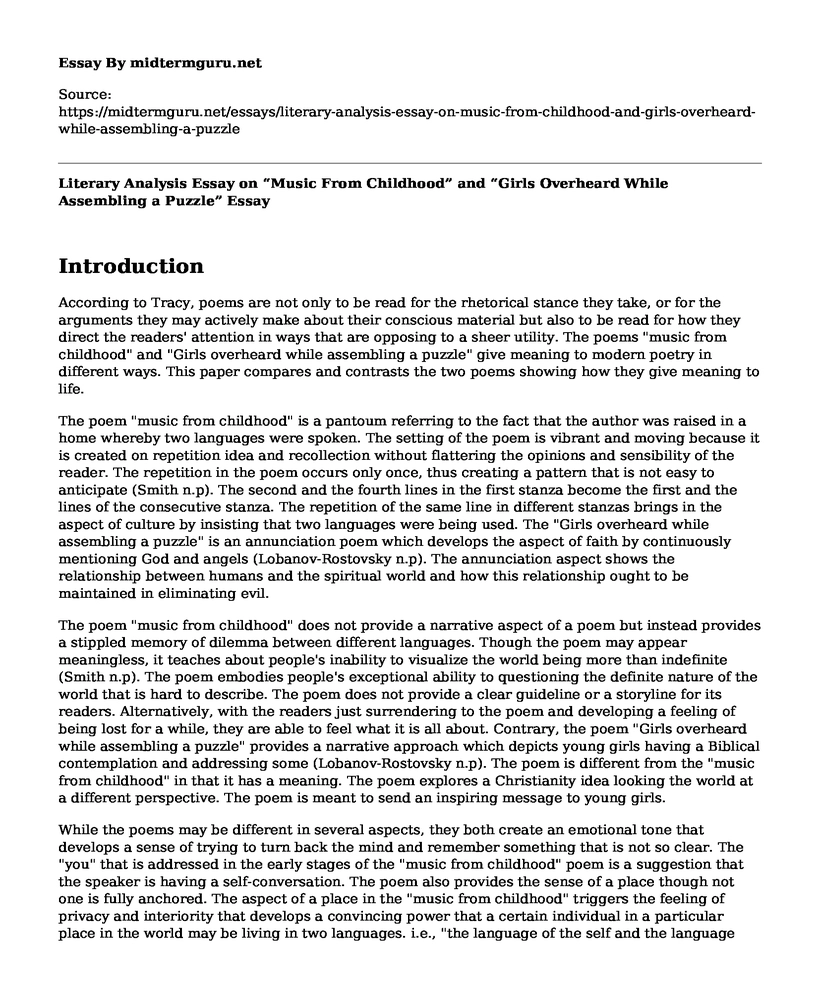Introduction
According to Tracy, poems are not only to be read for the rhetorical stance they take, or for the arguments they may actively make about their conscious material but also to be read for how they direct the readers' attention in ways that are opposing to a sheer utility. The poems "music from childhood" and "Girls overheard while assembling a puzzle" give meaning to modern poetry in different ways. This paper compares and contrasts the two poems showing how they give meaning to life.
The poem "music from childhood" is a pantoum referring to the fact that the author was raised in a home whereby two languages were spoken. The setting of the poem is vibrant and moving because it is created on repetition idea and recollection without flattering the opinions and sensibility of the reader. The repetition in the poem occurs only once, thus creating a pattern that is not easy to anticipate (Smith n.p). The second and the fourth lines in the first stanza become the first and the lines of the consecutive stanza. The repetition of the same line in different stanzas brings in the aspect of culture by insisting that two languages were being used. The "Girls overheard while assembling a puzzle" is an annunciation poem which develops the aspect of faith by continuously mentioning God and angels (Lobanov-Rostovsky n.p). The annunciation aspect shows the relationship between humans and the spiritual world and how this relationship ought to be maintained in eliminating evil.
The poem "music from childhood" does not provide a narrative aspect of a poem but instead provides a stippled memory of dilemma between different languages. Though the poem may appear meaningless, it teaches about people's inability to visualize the world being more than indefinite (Smith n.p). The poem embodies people's exceptional ability to questioning the definite nature of the world that is hard to describe. The poem does not provide a clear guideline or a storyline for its readers. Alternatively, with the readers just surrendering to the poem and developing a feeling of being lost for a while, they are able to feel what it is all about. Contrary, the poem "Girls overheard while assembling a puzzle" provides a narrative approach which depicts young girls having a Biblical contemplation and addressing some (Lobanov-Rostovsky n.p). The poem is different from the "music from childhood" in that it has a meaning. The poem explores a Christianity idea looking the world at a different perspective. The poem is meant to send an inspiring message to young girls.
While the poems may be different in several aspects, they both create an emotional tone that develops a sense of trying to turn back the mind and remember something that is not so clear. The "you" that is addressed in the early stages of the "music from childhood" poem is a suggestion that the speaker is having a self-conversation. The poem also provides the sense of a place though not one is fully anchored. The aspect of a place in the "music from childhood" triggers the feeling of privacy and interiority that develops a convincing power that a certain individual in a particular place in the world may be living in two languages. i.e., "the language of the self and the language that comes from outside of the self" (Smith n.p) "Girls overheard while assembling a puzzle" poem makes use of abecedarian style to create a tone which juxtaposes the key phrases drawing out their resonance (Lobanov-Rostovsky n.p). The mood in the poem is a revelation of a deeper structure that triggers an inner feeling of peace.
Both poems have the aspect of culture. In the music from childhood poem, culture is based on an environment where there is more than one language. In this type of environment, there exists variation in a language where the meaning of a word in one language may have another meaning in the other language. In this cultural environment, People are required to develop a broad understanding of the different languages while at the same time having a clear differentiation between aspects of one language from the other. The poem "Girls overheard while assembling a puzzle" on the other hand, is based on spiritual culture whereby as Christians, there are particular codes that are to be upheld in maintaining a relationship with God.
Conclusion
In conclusion, both poems are good examples of how poetry can lead people more deeply within themselves and develop an inner motivation. The "music from childhood" leads to the reader to understanding there are other forms of communities in existence exist in spite of the usual dividing lines they taught to observe. According to Smith, the "Music from Childhood poem persuasively unsettles the unthinking or automatic ways we often experience content, language, and narratives" (Smith n.p) The same applies to the "Girls overheard while assembling a puzzle" poem whereby it creates a puzzling effect on the characters own sexuality and shapes the behavior not to act against the eternal beings.
Works Cited
Smith, Tracy K. "Staying Human: Poetry in the Age of Technology." Washington Post (2018).
Lobanov-Rostovsky, Sergei. "Why We Chose It << Kenyon Review Blog." The Kenyon Review, 17 Oct. 2013, www.kenyonreview.org/2011/10/why-we-chose-it-6/.
Cite this page
Literary Analysis Essay on "Music From Childhood" and "Girls Overheard While Assembling a Puzzle". (2023, Jan 15). Retrieved from https://midtermguru.com/essays/literary-analysis-essay-on-music-from-childhood-and-girls-overheard-while-assembling-a-puzzle
If you are the original author of this essay and no longer wish to have it published on the midtermguru.com website, please click below to request its removal:
- For Those Who Can Still Ride an Airplane for the First Time by Anis Mojgani
- Essay on Of Mice and Men by John Steinbeck
- Identification and the Analysis of the Myth
- Critical Essay King Lear: Doube Pots
- Compare and Contrast Essay on Mythological Gods: Hermes and Eshu
- Beowulf Expository Writing Project
- Critical Essay on Beowulf Poem Themes







